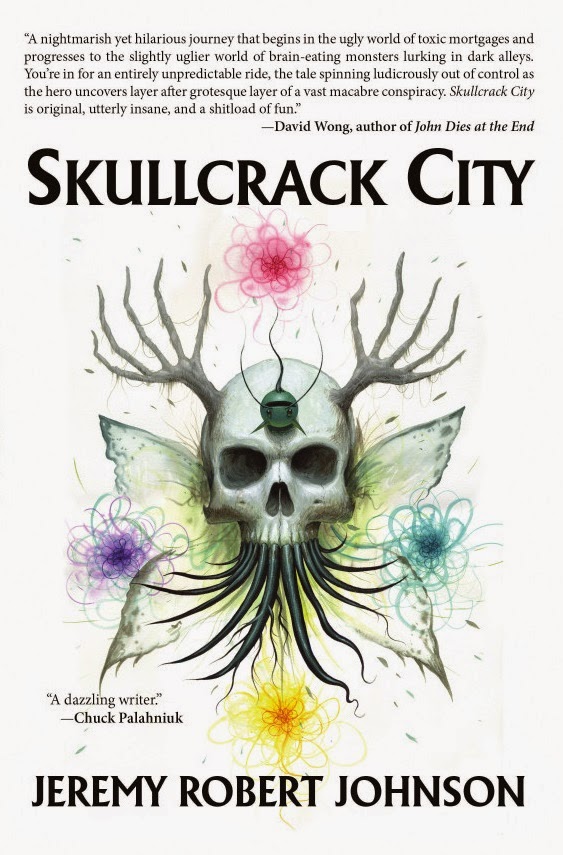 Read this—lived in this—two or so weeks ago, but haven’t had a spare minute at the keyboard until now, just because of what Bob Seger calls deadlines and commitments. But it’s been cycling through my brainpan this whole time. Jeremy Robert Johnson’s last book, the collection We Live Inside You, has some pretty persistent parasites popping up and burrowing in through the stories. I kind of fear Skullcrack City may be just such a parasite—a story you think you’re done with. But it’s not done with you.
Read this—lived in this—two or so weeks ago, but haven’t had a spare minute at the keyboard until now, just because of what Bob Seger calls deadlines and commitments. But it’s been cycling through my brainpan this whole time. Jeremy Robert Johnson’s last book, the collection We Live Inside You, has some pretty persistent parasites popping up and burrowing in through the stories. I kind of fear Skullcrack City may be just such a parasite—a story you think you’re done with. But it’s not done with you.
And, no, no worries: whereas a lot of writers who are known for their proficiency with and in the short story tend to produce first novels that are really just five or six long stories braided together like we’re stupid enough not to notice, Skullcrack City is a novel all on its own: crystal clear plot, a tension that ratchets up with each surprise development yet never quite steps over into absurdity, and, most important, a single character on a quest, a dude with all these insane obstacles, both internal and external, a single character with—get this—a love interest, of all things. And a mom. And a turtle. And a job he hates. And a bad history with drugs.
But that’s just the long way of saying it’s a novel.
Where Skullcrack City absolutely excelerates (my word) past most everything else on the shelf, it’s the pairing of two things that rarely appear between the same covers: a headlong, nearly frenetic narrative velocity and language so precise you want to stop just to be jealous, phrasing so sharp you’re pretty sure it’s maybe going to Bunuel your eyeballs, let the jelly out.
Examples:
- My heart fluttered and then resumed its regularly scheduled beat
- There’s no gateway drug if you try them all at once
- My new laptop had a seven-inch screen—the better to hunch into
- There were no buttons on the dash which could help with overwhelming guilt
None of which show off the velocity, the pace at which this thing moves. But you can at least get a sense of the voice in those four lines, I think. And, you know how when you read, say, Cormac McCarthy, the lines are all chiseled and warped into some new and irregular shape that exists kind of at the edge of graspability—and we like that? JRJ’s lines each feel similarly sculpted, pored over with that Flaubert kind of quality control until they cried for mercy, until they bled all their non-vital ink out, but instead of defamiliarizing the world in a finally pleasurable way, it feels more like they’re articulating the world in a way our best inner selves would, if we also had two hours to write and erase each word of every sentence. Yet, at no moment does JRJ break Elmore Leonard’s cardinal rule, of writing writing that sounds like writing. Every single bit of Skullcrack City feels not just natural, but like, really, the only expression possible in this twisted-up, semi-future corporate hellscape of Portland.
And, the best novels, at least for me (but I would hope for everyone), they’re the ones where, inside of fifty pages, you get a real sense of where this is going, you see without any doubt that no way can this last past p.125, and then you thumb through the remaining 207 pages (Skullcrack‘s 332; this has been some painful math for me to have just done, so please appreciate it) and shake your head no, because this kind of escalation, it can’t continue, the thing has to explode, the train can’t go that fast for that long, Casey, not in these conditions.
However, Skullcrack City, man, it’s got life after life. Just when you think it’s about to hit the wall, it pulls a Roadrunner, paints a tunnel and never misses a step. And, yes—after all, this is the Bizarro genre we know and mainline—it does get twisted and gross and bitey, and yes, because this is JRJ, this is a world where you can have an external brain or a stone eye or a pistol that’s pretty much Reed Richards’ ultimate nullifier. Also, though, because this is just a flat-out good novel, this is also a world where there’s the distinct if distant possibility of beauty, too. And redemption. Just, it’s a struggle to get there. There’s sacrifices. And there’s a moment in here—I won’t say where but those with the eyes to see will see—where both the development and the scene synch up for a few magic moments and effect what I can only call a Lansdale move. Just because, of everybody on the scene, Lansdale’s the only writer I’ve ever seen pull this off. Until Skullcrack City. Until Jeremy Robert Johnson. Dude’s got the writing chops to spare, it turns out, and he never flinches.
I’ve read a lot of solid novels so far this year, but, as of a couple of weeks ago, this is the best one, by far. It’s the complete package. And I’ve told you nothing concrete about it, I know. The reason for that is that I want you to go into this like you should go into every novel: like snuffing your candle at the deepest part of the cave, then jumping into the pool, letting the water swallow you down, deliver you to a chamber nobody’s ever seen before.
Skullcrack City, it takes you right there. And then it pushes you deeper. I’m a better writer for having read this one. And this won’t be the last time I read it, either. It’s going on the shelf with Craig Clevenger’s The Contortionist ‘s Handbook and Megan Abbot’s Dare Me and Sara Gran’s Come Closer : books that only end when you stop reading them. Which is never.


 is the NYT bestselling author of 30 or so books, +350 stories, some comic books, and all this stuff here. He lives in Boulder, Colorado, and has a few broken-down old trucks, one PhD, and way too many boots. More
is the NYT bestselling author of 30 or so books, +350 stories, some comic books, and all this stuff here. He lives in Boulder, Colorado, and has a few broken-down old trucks, one PhD, and way too many boots. More